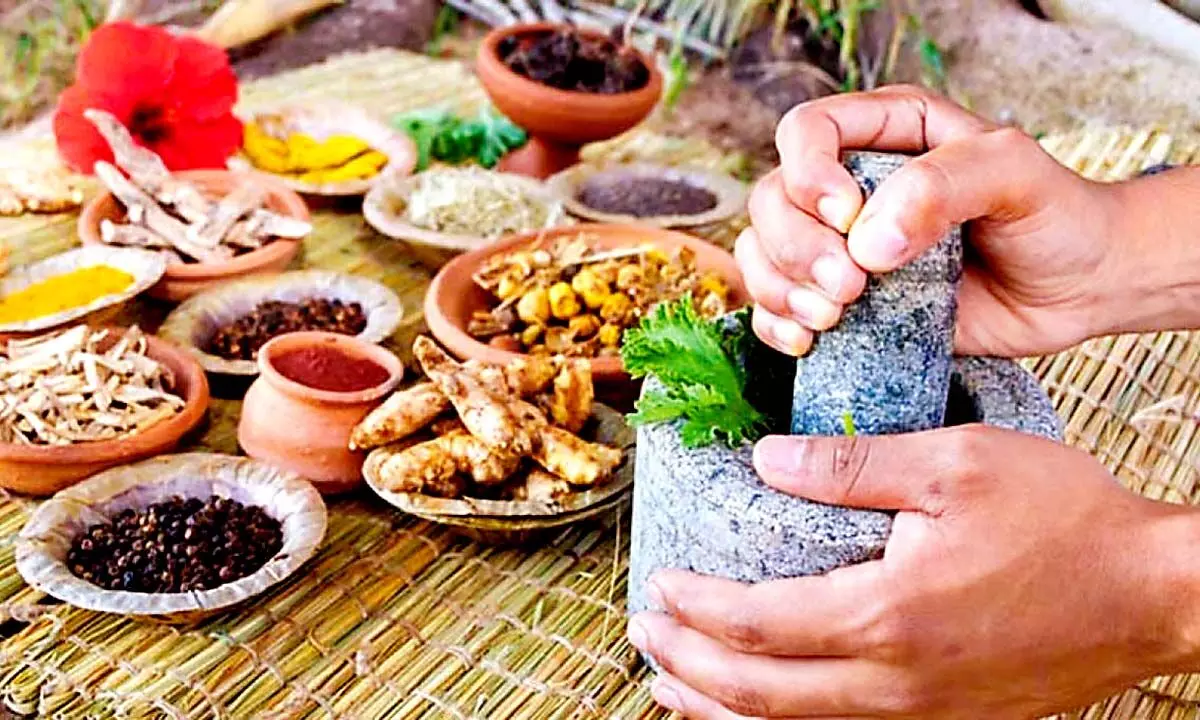WHO mulling over regulatory platform for Ayurveda practitioners
The initiative intends to make Ayurveda medicines acceptable and accessible to the entire world within a period of 10 to 15 years
image for illustrative purpose

It is of great importance to create a methodology to utilise and improve access to safe, effective, quality and affordable healthcare. The scope of Ayurveda lies in the domains of psychological, physical, spiritual, and social dimensions of life. Of course, Ayurveda is a source of innovation as there is a huge potential for new ideas to crop up from Ayurveda
To accelerate the global acceptance and accessibility of Ayurveda system of medicine, the World Health Organisation (WHO) is seriously contemplating to set up a multi-country regulatory cooperation platform for traditional medicine practitioners. By establishing this platform for traditional medicine practitioners, the WHO intends to make Ayurveda medicines acceptable and accessible to the entire world within a period of 10 to 15 years. According to rough estimates, the global market for Ayurveda medicines is $30 billion in 2022 and about 93 Member States of WHO acknowledged the use of Ayurveda in their countries. Speaking at a session on 'Expanding Scope of Ayurveda' at the 9th edition of the World Ayurveda Congress (WAC) & Arogya Expo 2022 at Panaji in Goa recently, Dr Geetha Krishnan, Technical Officer, Traditional Medicine, WHO, said that WHO's global centre of traditional medicine will work with several governments to bring out more evidence-based Ayurveda to the globe. WHO is half-way through in the work to include Ayurveda in the international classification of diseases. Dr Krishnan said WHO considers Ayurveda to be useful in several ways that will allow it to achieve the UN Sustainable Development Goals (SDGs) by 2030. Prevention, early detection and rehabilitation to improve healthy life expectancy are among the priorities of the WHO in future. Based on these, the WHO will have to understand how to utilise the nearly 500,000 registered practitioners of Ayurveda globally, to achieve these goals. Of late, the WHO has taken several initiatives to promote Ayurveda, as it has recently come out with training modules for Ayurveda, benchmarks for regulating its practices and a standardised terminology document that would help Ayurveda practitioners to interact with modern medicine in an easier manner.
The WHO's initiative to promote traditional systems of medicine is a right step in right direction as there are no two opinions about the growing global interest in traditional medicines for disease resistance and treatment, including for the treatment of Covid-19. It is an undisputed fact that Ayush products played a significant role in providing the much-needed immunity to the general public to fight the deadly coronavirus disease, which has taken a huge toll across the world, especially in the developed world including the US. The emerging evidence of a correlation between the low Covid-19 mortality rates and large-scale adoption of Ayush prophylactic solutions by the population in India is significant for the public health practice in the country. As the entire world was running amok for a timely solution to fight the deadly virus, the frontline role played by the Ayush sector in the fight against Covid-19 received kudos from one and all. It is quite true that traditional medicine is a key pillar of healthcare delivery systems and it plays a crucial role in maintaining good health and well-being not only in India but across the world. In recent years, traditional medicine therapies have also seen a major transformation as usage of artificial intelligence and technological innovations have made it more accessible to the masses.
Earlier in April this year, Prime Minister Narendra Modi had laid the foundation stone for the WHO Global Centre for Traditional Medicine (GCTM) in Jamnagar, Gujarat. Being established by the Union Ministry of Ayush in collaboration with the WHO, this will be the world's first and the only global centre for traditional medicine which will highlight the potential of traditional medicine and utilize technological advancements to promote its safe and effective use. The primary objective of this global centre is to harness the potential of traditional medicine from across the world through modern science and technology and improve overall health of the communities' world over. It is sure the establishment of the Global Centre for Traditional Medicine will be a boon to the masses as it aims to integrate the benefits of traditional medicine with the achievements of modern science and create a comprehensive health strategy. This centre will concentrate on building a solid evidence base for policies and standards on traditional medicine practices and products and help countries integrate it as appropriate into their health systems and regulate its quality and safety for optimal and sustainable impact. It is a fact that Ayurveda is a cost-effective healthcare system for individuals as well as the community, and Ayurvedic concepts can be totally utilised for achieving the SDGs if these are considered under the perspective of products, practices and practitioners. It is of great importance to create a methodology to utilise and improve access to safe, effective, quality and affordable healthcare. The scope of Ayurveda lies in the domains of psychological, physical, spiritual, and social dimensions of life. Of course, Ayurveda is a source of innovation as there is a huge potential for new ideas to crop up from Ayurveda.
(The author is a freelance journalist with varied experience in different fields)

